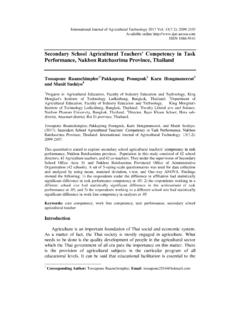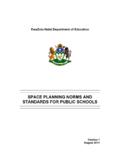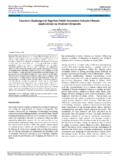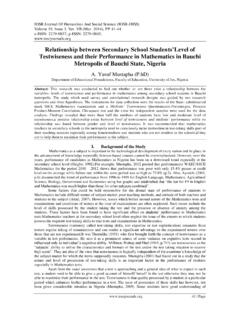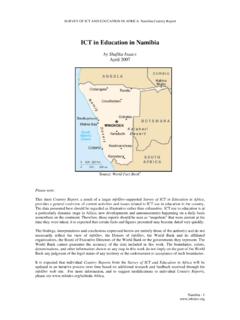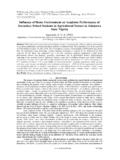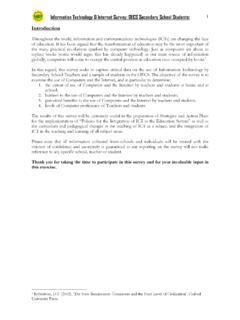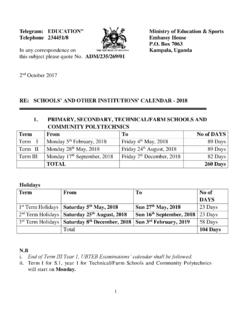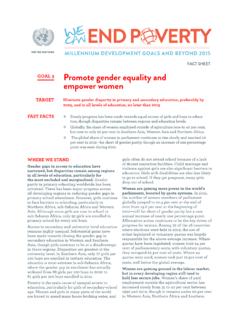Transcription of Implementation of Nigerian Secondary School …
1 ROCARE / ERNWACA Tel: (223) 20 21 16 12, Fax: (223) 20 21 21 15 BP E 1854, Bamako, MALI B nin Burkina Faso Cameroun Congo C te d Ivoire Gambia Ghana Guin e Mali Mauritanie Niger Nigeria S n gal Sierra Leone R publique Centrafricaine Togo ERNWACA Research Grants Programme 2009 edition A Critical Appraisal of the Mode of Implementation of Nigerian Secondary School Curriculum: Towards Socio-economic Empowerment of Youth Researchers Ofoha Dorothy, (F) lecturer Uchegbu Catherine Ngozi, (F) lecturer Anyikwa Blessing, (F) lecturer Nkemdirim Micheal (M) Doctoral student Mentor: Dr.
2 (Mrs.) Lucy Ekwueme, University of Lagos Country: Nigeria Research financed by Education Research Network for West and Central Africa (ERNWACA) With project support from UEMOA regional Centre of Excellence and the Ministry of Foreign Affairs of the Netherlands ii Acknowledgements This research has been made possible with funding support from Educational Research Network for West and Central Africa (ERNWACA). To this Network, the research team expresses profound gratitude for this unique opportunity.
3 We also thank the project mentor, Dr. Lucy Ekwueme for her significant contributions and guidance. We are also indebted in gratitude to members of ERNWACA National Coordination including Prof. Kasali Adegoke, Prof. Temi Busari and Dr. Dayo Odukoya for their support and encouragement, and not forgetting Mrs Kate Onuoha, as well as various other individuals who contributed in one way or the other to making the project what it is. Above all, we thank the Almighty God for giving us the privilege to undertake this study.
4 Iii Table of Contents Title page ..i Table of List of Executive CHAPTER ONE: INTRODUCTION Background of the Statement of Purpose of Significance of Research Scope of Operational Definition of Terms and CHAPTER TWO: LITERATURE REVIEW Theoretical Framework Functional Curriculum The Concept and Meaning of Nigerian Secondary Education Goals and Curriculum for Wealth Creation Concept of Vocational and Technical Secondary Education Curriculum Implementation in CHAPTER THREE: METHODOLOGY Research Sample and Sampling Pilot Study /Validation of Procedure for Data Data RESULTS Testing of Research Question one.
5 Appropriateness of the Nigerian Secondary education in terms of goals, content, method, in meeting the philosophy of Nigerian educational system ..21 Testing of Research Question two: Teaching method used in implementing the curriculum in Nigeria Secondary Testing of Research Question three: Number of skill-based subjects taught in Nigerian Secondary Testing of Research Question four: Infrastructural facilities available in Nigerian Secondary iv Testing of Research Question five: Proportion of specialist teachers available in Nigerian Secondary Testing of Research Question six.
6 Practical (entrepreneurial) skills students have learnt in School with which they can create Testing of Research Question seven: Students entrepreneurial capability Products and services students have produced on their Testing of Research Question eight: Effect of School location on the mode of curriculum Testing of Research Question nine: Effect of School type on the mode of curriculum DISCUSSION OF FINDINGS, RECOMMENDATIONS, AND CONCLUSION Summary of Limitation of the Conclusion and policy implication of the Suggestions for further APPENDIX v List of Tables TABLE PAGE 1 Description of student-sample by zone, state, School type.
7 Class and Descriptive data of use of theoretical-based Descriptive data of use of practical-based Descriptive data of skill-based subjects taught in study Descriptive data of infrastructural facilities available in study Descriptive data of proportion of specialist teachers available in study Descriptive data of practical (entrepreneurial) skills students have learnt in School by School Descriptive data of practical (entrepreneurial) skills students have learnt in School by state/ School Descriptive data of practical (entrepreneurial)
8 Skills students have learnt in School by Descriptive data of products and services students have Descriptive data of effect of School location on mode of curriculum Chi-Square Test data of effect of School location on mode of curriculum Descriptive data of effect of School type on mode of curriculum Chi-Square Test data of effect of School location on mode of curriculum vi List of Appendices APPENDIX PAGE 1. Teacher Assessment A1 2. Student Assessment A3 3.
9 Focus Group Discussion A5 4. Observation A6 5. Practical /Performance A7 6a, b, c. Observation Data: Nasarawa, Imo, Lagos A8 7a, b, c. Focus Group Discussion Data: Nasarawa, Imo, Lagos A10 8a, b, c. Practical Test Data: Nasarawa, Imo, Lagos A13 vii Executive Summary Nigeria, having realized the effectiveness of education as a powerful instrument for national progress and development, adjusted her Secondary School educational system to encompass diversified curriculum that integrates academic with technical and vocational subjects with a view to empowering the individual for self-employment.
10 However, the educational system does not seem to achieve its purpose as majority of School leavers are not equipped with necessary skills to empower themselves. Consequently they cannot raise their socio-economic standard and therefore cannot contribute to nation building; hence, the need for this study. The broad aim of the study was to assess how the curriculum was implemented in Nigerian Secondary schools with a view to identifying the root cause of the problem. Some of the specific objectives include: determine the appropriateness of Nigeria Secondary education curriculum; find out type of teaching method used in implementing the curriculum; determine number of skill-based subjects taught in School ; identify practical [entrepreneurial] skills students have learnt in School with which they can create self-employment; identify products and services students have produced.


